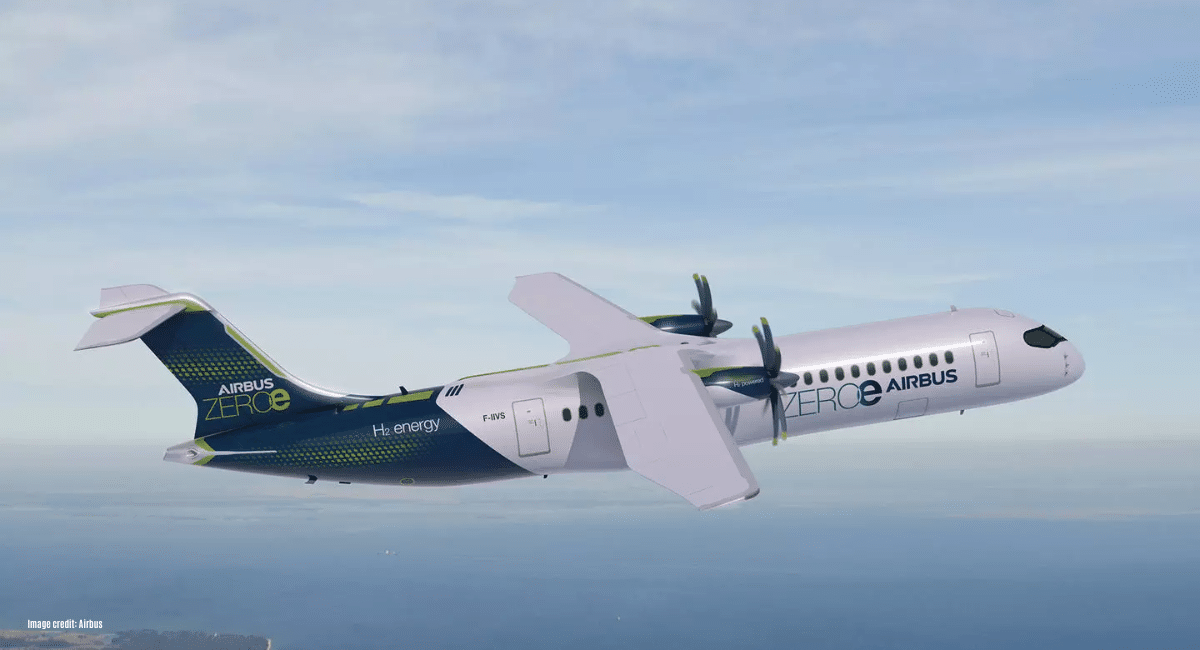In late 2023, Airbus achieved a major milestone in its sustainable aviation testing by powering-on the iron pod, a hydrogen-propulsion system for its electric concept aircraft, ZEROe. The achievement places Airbus firmly “on-track” to launching a hydrogen-propelled aircraft into service by 2035.
Hauke Peer-Luedders, Head of Fuel Cell Propulsion System for ZEROe said:
“It has been three years since we revealed an aircraft concept 100% powered by hydrogen fuel cells. Since then, we have adhered to our initial timeline and made tremendous progress. The recent success of powering on the iron pod system at 1.2 megawatts is a crucial step towards our goal of putting a hydrogen-powered aircraft in the skies by 2035.”
The fuel cells convert hydrogen into electricity through a chemical reaction, powering a propeller propulsion system with a by-product of simple H20, resulting in “almost zero emissions.” The team achieved the first successful power up of the electric motors of the iron pod using the hydrogen fuel cells for the first time.
To reach this milestone, Airbus created Aerostack, a joint venture with ElringKlinger, developing hydrogen fuel cell stacks. They also successfully tested the hydrogen fuel cell system in June 2023, reaching its full-power level of 1.2 megawatts – the most powerful test ever achieved in aviation of a fuel cell designed for large-scale aircraft.
During 2024, testing will continue on this first version of the iron pod while the ZEROe team optimises the size, mass, and qualifications of the propulsion system to meet flight specifications. Next steps will involve the installation of the fuel cell propulsion system on the ZEROe multimodal flight test platform – the first A380 ever produced by Airbus, MSN001 and ground testing of systems.
Working hard to realise the potential of hydrogen, Airbus recently opened a ZEROe Development Centre (ZEDC) for hydrogen technologies at its site in Stade. The centre is focusing on the development of cost-competitive lightweight Hydrogen systems in composites. Sabine Klauke, Airbus Chief Technical Officer said:
“The ZEDC will benefit from the wider composite research and development ecosystem such as the Airbus subsidiary Composite Technology Center (CTC GmbH), the CFK NORD in Stade as well as from further synergies from space and maritime activities.”
In April, Grzegorz Ombach, Head of Disruptive R&T, Senior Vice President, Airbus will be speaking at Aerospace Tech Week on a panel exploring net-zero technologies. The agenda will be released imminently, so stay tuned.
For more like this see:
- UK Hydrogen Alliance Established to Accelerate Zero Carbon Aviation
- Collins Aerospace to Develop Thermoplastics for Liquid Hydrogen Tanks
- Universal Hydrogen Completes First Flight of Hydrogen Regional Airliner
